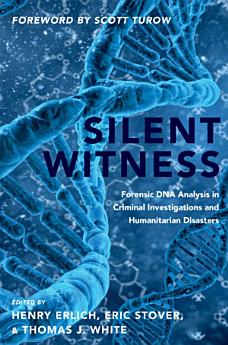Silent Witness: Forensic DNA Evidence in Criminal Investigations and Humanitarian Disasters
Henry Erlich · Eric Stover · Thomas J. White
Sep 2020 · Oxford University Press
5.0star
1 reviewreport
Ebook
280
Pages
family_home
Eligible
info
reportRatings and reviews aren’t verified Learn More
About this ebook
Since its introduction in the late 1980s, DNA analysis has revolutionized the forensic sciences: it has helped to convict the guilty, exonerate the wrongfully convicted, identify victims of mass atrocities, and reunite families whose members have been separated by war and repressive regimes. Yet, many of the scientific, legal, societal, and ethical concepts that underpin forensic DNA analysis remain poorly understood, and their application often controversial. Told by over twenty experts in genetics, law, and social science, Silent Witness relates the history and development of modern DNA forensics and its application in both the courtroom and humanitarian settings. Across three thematic sections, Silent Witness tracks the scientific advances in DNA analysis and how these developments have affected criminal and social justice, whether through the arrests of new suspects, as in the case of the Golden State Killer, or through the ability to identify victims of war, terrorism, and human rights abuses, as in the cases of the disappeared in Argentina and the former Yugoslavia and those who perished during the 9/11 attacks. By providing a critical inquiry into modern forensic DNA science, Silent Witness underscores the need to balance the benefits of using forensic genetics to solve crime with the democratic right to safeguard against privacy invasion and unwarranted government scrutiny, and raises the question of what it means to be an autonomous individual in a world where the most personal elements of one's identity are now publicly accessible.
Ratings and reviews
5.0
1 review
Anil Das
- Flag inappropriate
July 16, 2021
AÀA BOSS NETWORK
About the author
Henry Erlich is Senior Scientist at the Benioff Children's Hospital Oakland Research Institute. He was previously Vice President of Discovery Research at Roche Molecular Systems and Director of Human Genetics at Cetus Corporation. He is a pioneer in the development and application of PCR in forensic DNA analysis and performed the first DNA-based forensic analysis in the United State in 1986 and the first DNA-based exoneration in 1988. Erlich also pioneered the development of DNA-based HLA typing and its application to the study of the genetics of autoimmune diseases. He is the author of over 450 scientific articles and has been the recipient of numerous awards, including the "DNA Profiles in Courage Award" from the National Institute of Justice in 2001. Eric Stover is Faculty Director and Adjunct Professor of Law and Public Health at the Human Rights Center, School of Law, University of California, Berkeley. Since the 1980s, he has led forensic missions to investigate the fate of the disappeared in Argentina, Guatemala, Brazil, El Salvador, Mexico, Iraq, the former Yugoslavia, and Rwanda. In 1984, Stover testified about the forensic search for the disappeared in the trial of Argentina's former ruling junta. He is the author and co-editor of several books on the forensic sciences and human rights and has co-produced several documentaries, including the 2017 PBS three-part series "Dead Reckoning: War, Crime, and Justice from World War II to the War on Terror." Thomas J. White is an advisor to the Human Rights Center, School of Law, University of California, Berkeley, and former 2012-2013 Regents Lecturer at the University of California, Berkeley. He previously held the positions of Vice President of Research at Cetus Corporation, Senior Vice President of Research & Development at Roche Molecular Systems, and Chief Scientific Officer at Celera Corporation. He is co-editor of four books on DNA analysis, two published by Academic Press and two by the American Association for Microbiology Press, and is co-author on 100 articles in peer-reviewed scientific and medical journals.
Rate this ebook
Tell us what you think.
Reading information
Smartphones and tablets
Install the Google Play Books app for Android and iPad/iPhone. It syncs automatically with your account and allows you to read online or offline wherever you are.
Laptops and computers
You can listen to audiobooks purchased on Google Play using your computer's web browser.
eReaders and other devices
To read on e-ink devices like Kobo eReaders, you'll need to download a file and transfer it to your device. Follow the detailed Help Center instructions to transfer the files to supported eReaders.





